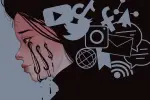Dream Theater is an American progressive metal band formed in 1985, and their album “Six Degrees of Inner Turbulence,” whose subject matter was quite impressive for its time, was released in 2002. Though Dream Theater is a metal band, “Six Degrees of Inner Turbulence” doesn’t feature much screaming or an intense, loud sound. Instead, the songs vary from gentle-sounding tracks to progressive rock.
The “Six Degrees” refer to six people all suffering from a different type of mental illness. The album represents each person in a realistic way on their own track that doesn’t glorify or stigmatize their illness.
The album covers bipolar disorder, post-traumatic stress disorder, schizophrenia, post-partum depression, autism and dissociative identity disorder. There are seven tracks total that detail each mental illness, and together they make one entire song called “Six Degrees of Inner Turbulence,” the same name as the album.
There are two discs on the album, but I’m only going to talk about the second one that focuses on mental illness. The second disc is 42 minutes long and is the longest song Dream Theater has recorded to date.
“About to Crash”
The track “About to Crash” details the life of a girl with bipolar disorder and how she handles mania and depression. The lyrics show her in a manic state: “She can’t stop pacing, she never felt so alive.” They also discuss her depressive states: “Once barely taking a break, now she sleeps the days away.” The way the lyrics talk about bipolar disorder is relatively accurate to how the disorder plays out in real life.
“About to Crash” even includes someone in the girl’s life who witnesses her episodes: “He says I’ve never seen her get this bad.” By including a figure who is presumably her father or friend, the band provides insight as to how bipolar disorder affects those close to the afflicted person, and how important it is to have someone around who can help.
The character in this track is the first of the “Degrees,” or people in “Six Degrees of Inner Turbulence,” and she sets the tone for the rest of the album. Her struggles are juxtaposed with the hardships of the following characters with mental illnesses. Another track near the end of the album comes back to this girl’s character, but it speaks from her point of view, which is helpful to those who want to see inside the mind of someone with this illness.
“War Inside My Head”
This track is about a soldier who suffers from post-traumatic stress disorder after serving in Vietnam. He thinks the condition can never be cured, as the lyrics refer to “trading innocence for permanent psychotic hell.” The tone of the song and how Dream Theater portrays the story drives home how damaging war is to soldiers, and that PTSD is a condition all too common among them.
The primary refrain in “War Inside My Head” is “hearing voices from miles away,” suggesting the character still feels he is at war and can’t escape the experiences he had. Intrusive memories are a prime symptom of PTSD and Dream Theater did an impressive job describing through their lyrics how it feels to experience them.
At the end of the track, the character fears he is “tasting danger with each word I say.” Symptoms of PTSD will worsen without treatment, which corresponds with how the end of this track reveals he feels his symptoms worsening and becoming more dangerous.
“The Test That Stumped Them All”
“The Test That Stumped Them All” describes a patient with schizophrenia who resides in a mental hospital but isn’t aware of his surroundings. The lyrics talk about the hallucinations he’s having, like “random blinding flashes aiming at the stage.” Schizophrenics are often paranoid and think people are out to get them, and this character seems to think the doctors at the mental hospital only use him as a way to solve the “test” that is schizophrenia.
The voices of the doctors differ from the voice of the patient, and they say, “We have just the place to fix him to save him from himself.” Schizophrenics are also known to harm themselves, so while the doctors may be trying to help by “saving” him, the character makes it seem like they’re evil. By the end of the track, the doctors are suggesting shock therapy.
Shock treatment for mental illnesses like schizophrenia has gotten a bad reputation because it was used so callously decades ago, but there are safe methods of shock and magnet treatments now that work for many mental disorders. The character in the track paints the doctors as evil, but it also seems like his delusions are getting the best of him.
“Goodnight Kiss”
This track is about a mother suffering from postpartum depression after she loses her baby, presumably during child birth. The lyrics say the child was “taken away from it all,” and the track is from the point of view of the mother. She’s still suffering from the sadness and anger because of the loss of her child and says, “It’s been five years to the day.”
The mother switches between blaming herself for the child’s death and blaming the doctors, exclaiming “those bastard doctors are going to pay.” A beeping heart monitor and a laughing doctor is heard, suggesting a problem with the baby. Although postpartum depression usually happens after a baby is born where the mother loses interest in the child, it can also occur after a miscarriage and even develop into major depression.
“Solitary Shell”
“Solitary Shell” is about a young boy who grows into a man that has autism or possibly schizoid personality disorder. The lyrics refer to the character as a boy who “daydreams in and out of his own world,” implying he is reclusive and not accepted by his peers. This track has a much gentler sound than “War Inside My Head” or “The Test That Stumped Them All,” which further demonstrates how Dream Theater sets the tone for each character and their mental illness.
The lyrics describe the boy turning into a man and how his solitude affects him: “As a man he was a danger to himself, fearful and sad most of the time.” The track illustrates how even if this character seems “fine,” he’s really suffering inside and needs acceptance, otherwise he’ll never leave his “solitary shell.”
“About to Crash (Reprise)”
This track brings back the female character with bipolar disorder from “About to Crash,” except now the lyrics are from her point of view. She picks up from where “About to Crash” left off and chronicles herself going through another manic episode, saying, “I’m invincible, despair will never find me.” She then falls back into a depressive episode and asks, “When I fall out of the sky, who’ll be standing by?”
“About to Crash (Reprise)” shows the character possibly recovering from her bipolar disorder because she seems more aware of the it and her need to get help. It’s interesting hearing her story from her point of view because “About to Crash” was left on a cliffhanger. Since she seems to be getting better, this track provides a more hopeful outlook for this character than the others.
“Losing Time / Grand Finale”
The last Degree, or person suffering from mental illness, is a girl with dissociative identity disorder. The lyrics say she “never wears makeup, but no one would care if she did anyway,” implying she doesn’t have many people who care about her in her life, possibly due to her multiple personalities. She gets a sort of amnesia, where she “doesn’t recall yesterday, faces seem twisted and strange.” This forgetfulness could be due to not being in control of one personality, so when she comes to, she can’t remember where she is.
Oftentimes sufferers of dissociative identity disorder need to “detach from themselves” because of trauma as a way for their brain to keep them alive. The track references this detachment and implies the character needs her disorder, otherwise she wouldn’t be able to cope.
“The Grand Finale” is included within this track, and recounts each of the six people with mental illness, with the ultimate message that we as a society need to be more accepting of them. The lyrics that end the album are touching and inspiring. Dream Theater implores us to reevaluate how we treat people with mental illness and the stigma surrounding it. They say that “Shame and disgrace over mental unrest keeps us from saving those we love.”
“Six Degrees of Inner Turbulence” is an album I think everyone should listen to because the six characters discussed in it are very much like real people suffering from real mental illnesses. Dream Theater does an admirable job representing these characters like actual people and respecting the mental illnesses they have, especially for the time this album was made. If you want a glimpse into how those suffering from mental illness think and the reasons behind their actions, or if you just want to listen to a really good album, put on “Six Degrees of Inner Turbulence.”
















